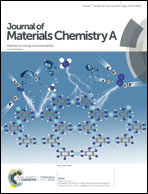High-temperature lead-free multilayer ceramic capacitors with ultrahigh energy density and efficiency fabricated via two-step sintering†
Abstract
The utilization of multilayer ceramic capacitors (MLCCs) in energy-storage applications is drawing increasing attention since the energy density of MLCCs has been improved significantly. However, the low dielectric breakdown strength and high loss at high temperatures are still key challenges which limit the application of MLCCs in high-voltage or high-temperature systems. In this work, a two-step sintering (TSS) method with a fast first-step heating rate of 40 °C min−1 is introduced to fabricate lead-free MLCCs. Compared with that of MLCCs sintered by the TSS method with a low heating rate of 4 °C min−1, the interface bonding between internal metal electrodes and dielectric layers of MLCCs sintered via the TSS method with the fast heating rate is dramatically improved. Nearly no pores between the internal electrodes and dielectric layers or discontinuity of internal electrodes is observed. A high energy density of 8.13 J cm−3 and an ultrahigh efficiency of 95% are achieved under an applied electric field of 750 kV cm−1 in the MLCC sintered via the TSS method with the fast heating rate. Furthermore, this TSS method sintered MLCC exhibits a wide usage temperature range up to 170 °C, with a variation of discharge energy density less than 7%. Notably, it maintains a high efficiency over 91% even at a high temperature of 170 °C. These features demonstrate that MLCCs sintered via the TSS method with the fast heating rate are promising candidates for high-temperature energy-storage applications.



 Please wait while we load your content...
Please wait while we load your content...